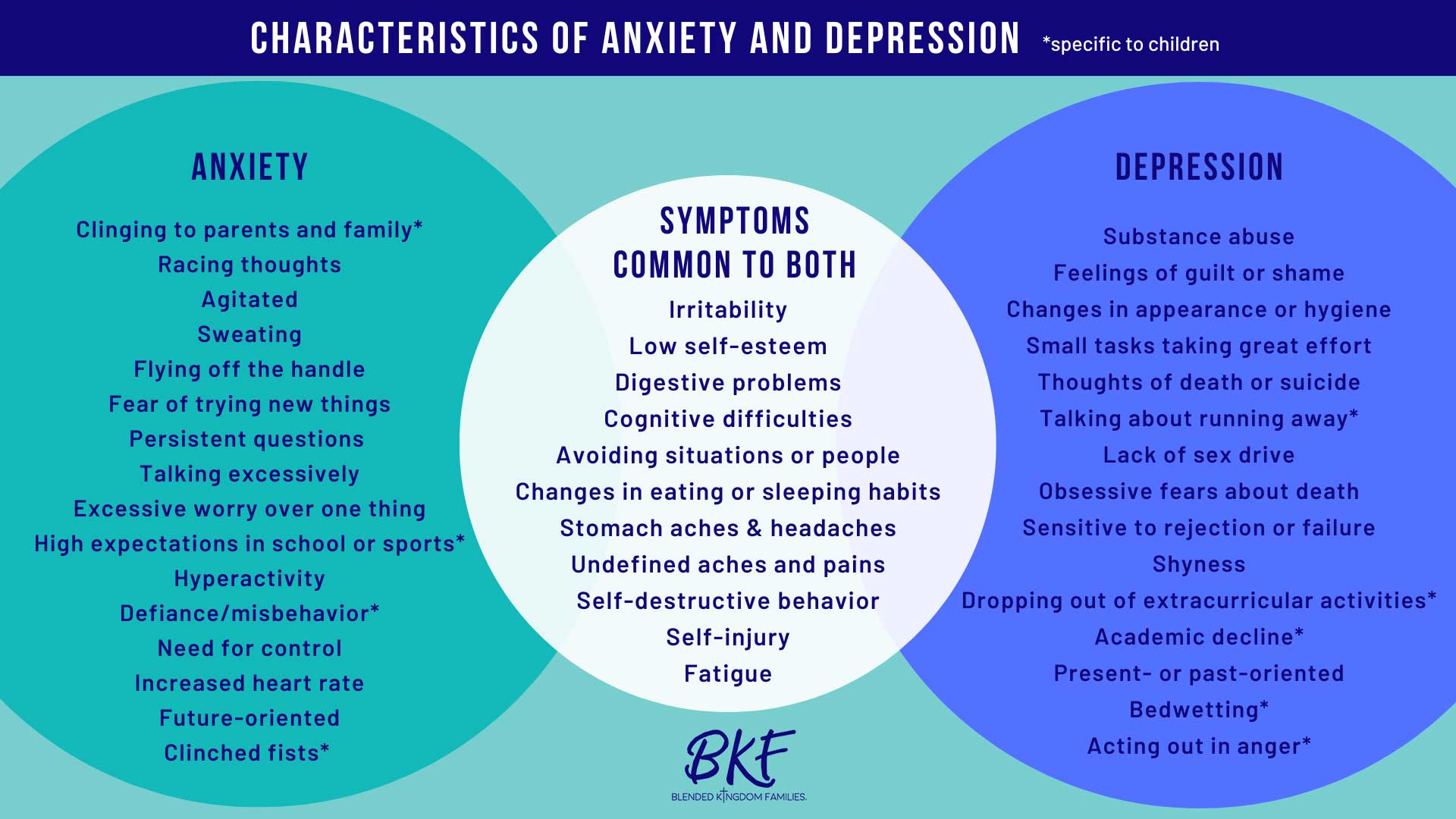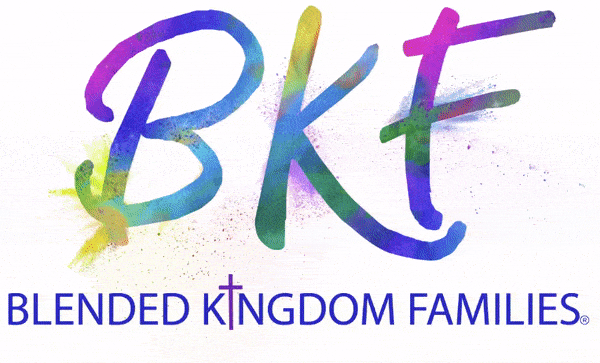Anxiety and Depression in Blended Families

Blended families face unique challenges that bring out a wide variety of emotions in you and your children, especially when you are beginning to blend. Feeling anxiety over blending your family is common, not only for you but also for your children. That anxiety and sadness can linger and interfere with their daily lives. The good news is children (and you) can learn tools to manage their mental health so they can thrive as the kids God created them to be.
What Are the Signs of Anxiety and Depression in Kids?
Anxiety and depression in your children or stepchildren may show up in ways you might not recognize as symptoms. After all, they probably haven’t learned the self-perception or language to say, “My mom is marrying a guy and I’m feeling anxious, particularly regarding the interpersonal dynamics at play.”
On the other hand, anxiety and depression in teenagers often looks like an adult’s symptoms, and they might be able to say, “I’m depressed.” But remember, teens are going through a lot just by being a teenager, and they might not be able to verbalize why their emotional state is out of balance.
To help you, we’ve created a chart that shows the most common symptoms of depression and anxiety, as well as the signs that are common to both experiences. The graphic also highlights the unique symptoms your children might demonstrate. Remember, teens’ symptoms will likely mirror those of adults.

It might be helpful to think of anxiety and depression as two sides of the same coin. With anxiety, your brain tends to think too fast—it’s in go, go, go mode. But with depression, your brain is lethargic—it’s in slow, slow, slow mode.
Having these symptoms doesn’t necessarily mean your child is struggling with anxiety or depression. After all, everybody feels anxious, and everybody feels down from time to time. It’s natural for your kids to feel some anxiety or sadness when you’re trying to blend families. But if your child is experiencing many of the symptoms for an extended period, then it might be time to intervene. The good news is your child can still thrive despite these challenges—because God wants your child to flourish!
What Causes Anxiety and Depression in Children?
In a lot of ways, children aren’t that different than adults when it comes to the causes of anxiety and depression. Loss, death of a loved one, serious illness, abuse, and other factors can lead to anxiety and/or depression. In blended families, some common triggers of anxiety and depression could include: moving; visitation; parents’ arguing in front of children; sharing a room with new stepsiblings; feeling forgotten by parents; lack of control over parents’ dating and remarriage; going to a new school; stepfamily relationships; wanting to please both biological parents. When your family is blending, your kids may not know how to cope with everything they’re feeling and experiencing. After all, they’ve likely never been through blending before!
How Do I Help My Child Through Anxiety and Depression?
The first thing to keep in mind is that God loves your child more than you do. That’s crazy to imagine, but it’s true. And God is working in this situation and will walk with your child (and you) through this season. Praying for your kids is absolutely the best first step you can take to help them. Here are other ways you can help your child:
- Talk to your child’s pediatrician. The symptoms your child is demonstrating may be caused by something other than anxiety or depression. For example, listlessness and weight loss may be caused by an underactive thyroid; lack of concentration and restlessness could be caused by hormonal imbalances or nutritional deficiencies. The pediatrician can rule out other biological causes. If the symptoms are severe and the doctor deemed it necessary, they may suggest medication—at least temporarily—to get the brain’s chemicals back in balance so your child and you can utilize other coping strategies.
- Find a therapist. We are huge advocates of therapy! A good counselor can offer perspective, provide a safe space to voice what’s going on inside, and give your child (and you) tools to navigate those big emotions. In fact, Scripture says there is wisdom in seeking the counsel of others (Prov. 13:10). It’s wise to get help from others when you’re dealing with depression and anxiety. If you need a place to start, we highly recommend Sevn Therapy. Often, the combination of medication and therapy can get your child back on more stable ground.
- Offer support and affirmation. Your children need to hear you say that you’re in their corner; that you believe in them; that they didn’t somehow do something wrong or fail in some way; that you will get through it together; that there is hope, especially because God is with you (Isaiah 9:6). Your kids need you to be their biggest and most vocal cheerleader (even though they won’t ever admit it!). This is especially true when you’re beginning to blend families and things feel unsure and unsafe.
- Activate some basic self-care. Make sure your child is getting enough rest, eating healthy foods (yeah, that’s not always easy) and getting some exercise. Time outside in the sun will boost their mood, too. Listening to worship music, reading God’s Word, and prayer are also great ways to find hope and encouragement—even at a young age.
You and your child might want to memorize Scripture that applies to their situation. Philippians 4:6-7 is a great place to start: “Do not be anxious about anything, but in everything by prayer and supplication with thanksgiving let your requests be made known to God. And the peace of God, which surpasses all understanding, will guard your hearts and your minds in Christ Jesus.” Deuteronomy 31:8 is another good option: “It is the Lord who goes before you. He will be with you; he will not leave you or forsake you. Do not fear or be dismayed.”
- Learn and use basic calming techniques. Your child might need to take some deep belly breaths, go for a walk, or picture a place they love (beach, field, mountain, etc.) when they’re feeling anxious or scared. Writing down how they feel or drawing a picture can go a long way to bring peace to their mind and heart. Intense thoughts and feelings often lose their strength when you name them.
Our kids are growing up in a crazy, chaotic world. But take heart. Jesus says He has overcome the world (John 16:33). Nothing you and your children face is beyond God’s sovereignty and care. Remember, He loves your kids—and He loves you, too! You may be walking through a challenging season, but He walks with you and your blended family. He’s got this, and with His help, so do you!

Scott and Vanessa Martindale
Founders of Blended Kingdom Families









